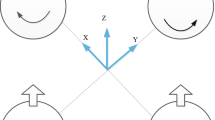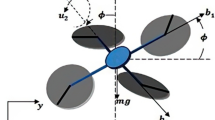Abstract
Nowadays, quadcopters are presented in many life applications which require the performance of automatic takeoff, trajectory tracking, and automatic landing. Thus, researchers are aiming to enhance the performance of these vehicles through low-cost sensing solutions and the design of executable and robust control techniques. Due to high nonlinearities, strong couplings and under-actuation, the control design process of a quadcopter is a rather challenging task. Therefore, the main objective of this work is demonstrated through two main aspects. The first is the design of an adaptive neuro-fuzzy inference system (ANFIS) controller to develop the attitude and altitude of a quadcopter. The second is to create a systematic framework for implementing flight controllers in embedded systems. A suitable model of the quadcopter is also developed by taking into account aerodynamics effects. To show the effectiveness of the ANFIS approach, the performance of a well-trained ANFIS controller is compared to a classical proportional-derivative (PD) controller and a properly tuned fuzzy logic controller. The controllers are compared and tested under several different flight conditions including the capability to reject external disturbances. In the first stage, performance evaluation takes place in a nonlinear simulation environment. Then, the ANFIS-based controllers alongside attitude and position estimators, and precision landing algorithms are implemented for executions in a real-time autopilot. In precision landing systems, an IR-camera is used to detect an IR-beacon on the ground for precise positioning. Several flight tests of a quadcopter are conducted for results validation. Both simulations and experiments demonstrated superior results for quadcopter stability in different flight scenarios.
Similar content being viewed by others
References
S. Bouabdallah, A. Noth, R. Siegwart. PID vs LQ control techniques applied to an indoor micro quadrotor. In Proceedings of IEEE/RSJ International Conference on Intelligent Robots and Systems, IEEE, Sendai, Japan, pp. 2451–2456, 2004. DOI: https://doi.org/10.1109/IROS.2004.1389776.
T. Luukkonen. Modeling and control of quadcopter. Journal of American Society for Mass Spectrometry, vol. 22, pp. 1134–1145, 2011
P. E. I. Pounds, D. R. Bersak, A. M. Dollar. Stability of small-scale UAV helicopters and quadrotors with added payload mass under PID control. Autonomous Robots, vol. 33, no. 1–2, pp. 129–142, 2012. DOI: https://doi.org/10.1007/s10514-012-9280-5.
D. K. Tiep, Y. J. Ryoo. An autonomous control of fuzzy-PD controller for quadcopter. International Journal of Fuzzy Logic and Intelligent Systems, vol. 17, no. 2, pp. 107–113, 2017. DOI: https://doi.org/10.5391/IJFIS.2017.17.2.107.
F. Santoso, M. A. Garratt, S. G. Anavatti. Fuzzy logic-based self-tuning autopilots for trajectory tracking of a low-cost quadcopter: A comparative study. In Proceedings of International Conference on Advanced Mechatronics, Intelligent Manufacture, and Industrial Automation, IEEE, Surabaya, Indonesia, pp. 64–69, 2015. DOI: https://doi.org/10.1109/ICAMIMIA.2015.7508004.
B. E. Demir, R. Bayir, F. Duran. Real-time trajectory tracking of an unmanned aerial vehicle using a self-tuning fuzzy proportional integral derivative controller. International Journal of Micro Air Vehicles, vol. 8, no. 4, pp. 252–268, 2016. DOI: https://doi.org/10.1177/1756829316675882.
M. Rabah, A. Rohan, Y. J. Han, S. H. Kim. Design of fuzzy-PID controller for quadcopter trajectory-tracking. International Journal of Fuzzy Logic and Intelligent Systems, vol. 18, no. 3, pp. 204–213, 2018. DOI: https://doi.org/10.5391/IJFIS.2018.18.3.204.
P. Garcia-Aunon, M. S. Peñas, J. M. de la Cruz García. Parameter selection based on fuzzy logic to improve UAV path-following algorithms. Journal of Applied Logic, vol. 24, pp. 62–75, 2017. DOI: https://doi.org/10.1016/j.jal.2016.11.025.
E. Kayacan, R. Maslim. Type-2 fuzzy logic trajectory tracking control of quadrotor VTOL aircraft with elliptic membership functions. IEEE/ASME Transactions on Mechatronics, vol. 22, no. 1, pp. 339–348, 2017. DOI: https://doi.org/10.1109/TMECH.2016.2614672.
A. Dorzhigulov, B. Bissengaliuly, B. F. Spencer Jr, J. Kim, A. P. James. ANFIS based quadrotor drone altitude control implementation on raspberry pi platform. Analog Integrated Circuits and Signal Processing, vol. 95, no. 3, pp. 435–445, 2018. DOI: https://doi.org/10.1007/s10470-018-1159-8.
D. Domingos, G. Camargo, F. Gomide. Autonomous fuzzy control and navigation of quadcopters. IFAC-PapersOn-Line, vol. 49, no. 5, pp. 73–78, 2016. DOI: https://doi.org/10.1016/j.ifacol.2016.07.092.
S. Kundu, D. R. Parhi. Reactive navigation of underwater mobile robot using ANFIS approach in a manifold manner. International Journal of Automation and Computing, vol. 14, no. 3, pp. 307–320, 2017. DOI: https://doi.org/10.1007/s11633-016-0983-5.
O. Salah, A. A. Ramadan, S. Sessa, A. A. Ismail, M. Fujie, A. Takanishi. ANFIS-based sensor fusion system of sit- to-stand for elderly people assistive device protocols. International Journal of Automation and Computing, vol. 10, no. 5, pp. 405–413, 2013. DOI: https://doi.org/10.1007/s11633-013-0737-6.
M. Gheisarnejad, M. H. Khooban. Supervised control strategy in trajectory tracking for a wheeled mobile robot. IET Collaborative Intelligent Manufacturing, vol. 1, no. 1, pp. 3–9, 2019. DOI: https://doi.org/10.1049/iet-cim.2018.0007.
M. Gheisarnejad, M. H. Khooban, J. Boudjadar. Adaptive network based fuzzy inference system for frequency regulation in modern maritime power systems. In Proceedings of the 5th International forum on Research and Technology for Society and Industry, IEEE, Florence, Italy, pp. 302–307, 2019. DOI: https://doi.org/10.1109/RTSI.2019.8895596.
M. Gheisarnejad, P. Karimaghaee, J. Boudjadar, M. H. Khooban. Real-time cellular wireless sensor testbed for frequency regulation in smart grids. IEEE Sensors Journal, vol. 19, no. 23, pp. 11656–11665, 2019. DOI: https://doi.org/10.1109/JSEN.2019.2934599.
M. Panda, B. Das, B. Subudhi, B. B. Pati. A comprehensive review of path planning algorithms for autonomous underwater vehicles. International Journal of Automation and Computing, vol. 17, no. 3, pp. 321–352, 2020. DOI: https://doi.org/10.1007/s11633-019-1204-9.
F. Santoso, M. A. Garratt, S. G. Anavatti. Adaptive neuro-fuzzy inference system identification for the dynamics of the AR.drone quadcopter. In Proceedings of International Conference on Sustainable Energy Engineering and Application, IEEE, Jakarta, Indonesia, pp. 55–60, 2016. DOI: https://doi.org/10.1109/ICSEEA.2016.7873567.
S. Rezazadeh, M. A. Ardestani, P. S. Sadeghi. Optimal attitude control of a quadrotor UAV using adaptive neuro-fuzzy inference system (ANFIS). In Proceedings of the 3rd International Conference on Control, Instrumentation, and Automation, IEEE, Tehran, Iran, pp. 219–223, 2013. DOI: https://doi.org/10.1109/ICCIAutom.2013.6912838.
S. Khatoon, I. Nasiruddin, M. Shahid. Design and simulation of a hybrid PD-ANFIS controller for attitude tracking control of a quadrotor UAV. Arabian Journal for Science and Engineering, vol. 42, no. 12, pp. 5211–5229, 2017. DOI: https://doi.org/10.1007/s13369-017-2586-z.
T. Bresciani. Modelling, Identification and Control of a Quadrotor Helicopter, Master dissertation, Lund University, Sweden, 2008.
D. Kotarski, Z. Benić, M. Krznar. Control design for unmanned aerial vehicles with four rotors. Interdisciplinary Description of Complex Systems: INDECS, vol. 14, no. 2, pp. 236–245, 2016.
N. S. Bao, X. Ran, Z. F. Wu, Y. F. Xue, K. Y. Wang. Research on attitude controller of quadcopter based on cascade PID control algorithm. In Proceedings of the 2nd Information Technology, Networking, Electronic and Automation Control Conference, IEEE, Chengdu, China, pp. 1493–1497, 2017. DOI: https://doi.org/10.1109/ITNEC.2017.8285044.
G. Ononiwu, O. Onojo, O. Ozioko, O. Nosiri. Quadcopter design for payload delivery. Journal of Computer and Communications, vol. 4, no. 10, pp. 1–12, 2016. DOI: https://doi.org/10.4236/jcc.2016.410001.
E. Kuantama, T. Vesselenyi, S. Dzitac, R. Tarca. PID and fuzzy-PID control model for quadcopter attitude with disturbance parameter. International Journal of Computers Communications & Control, vol. 12, no. 4, pp. 519–532, 2017. DOI: https://doi.org/10.15837/ijccc.2017.4.2962.
M. Hayajneh, M. Melega, L. Marconi. Design of autonomous smartphone based quadrotor and implementation of navigation and guidance systems. Mechatronics, vol. 49, pp. 119–133, 2018. DOI: https://doi.org/10.1016/j.mechatronics.2017.11.012.
M. R. Hayajneh, A. R. E. Badawi. Automatic UAV wireless charging over solar vehicle to enable frequent flight missions. In Proceedings of the 3rd International Conference on Automation, Control and Robots, Prague, Czech Republic, pp. 44–49, 2019.
MATLAB. Px4 autopilots support from embedded coder., [Online], 2020. Available: https://www.mathworks.com/hardware-support/px4-autopilots.html.
T-motor air 2213 920kv brushless motor, [Online], Available: http://dekasto.com/catalog/view/364.
C. S. Subudhi, D. Ezhilarasi. Modeling and trajectory tracking with cascaded PD controller for quadrotor. Procedia Computer Science, vol. 133, pp. 952–959, 2018. DOI: https://doi.org/10.1016/j.procs.2018.07.082.
G. Szafranski, R. Czyba. Different approaches of PID control UAV type quadrotor. In Proceedings of International Micro Air Vehicle Conference and Flight Competition, Delft, Netherlands, 2011.
Z. Mustapa, S. Saat, S. H. Husin, N. Abas. Altitude controller design for multi-copter UAV. In Proceedings of International Conference on Computer, Communications, and Control Technology, IEEE, Langkawi, Malaysia, pp. 382–387, 2014. DOI: https://doi.org/10.1109/I4CT.2014.6914210.
J. A. Paredes, C. Jacinto, R. Ramírez, I. Vargas, L. Trujillano. Simplified fuzzy-PD controller for behavior mixing and improved performance in quadcopter attitude control systems. In Proceedings of IEEE ANDESCON, IEEE, Arequipa, Peru, 2016. DOI: https://doi.org/10.1109/ANDESCON.2016.7836217.
E. S. Filatova, A. V. Devyatkin, A. I. Fridrix. UAV fuzzy logic stabilization system. In Proceedings of IEEE International Conference on Soft Computing and Measurements, IEEE, St. Petersburg, Russia, pp. 132–134, 2017. DOI: https://doi.org/10.1109/SCM.2017.7970517.
Acknowledgements
The authors acknowledge the Hashemite University for providing the financial and technical supports for this project. Also the authors thank all colleagues and students at Jordan University and at the Hashemite University for their valuable assistance.
Author information
Authors and Affiliations
Corresponding author
Additional information
Mohammad Al-Fetyani received the B. Sc. degree in mechatronics engineering with an excellent grade at The University of Jordan, Jordan in 2020. He is currently working as a research assistant at The University of Jordan and intends to complete his postgraduate studies.
His research interests include robotics and intelligent systems.
Mohammad Hayajneh received the B. Sc. and M. Sc. degrees in mechatronics engineering from Jordan University of Science and Technology, Jordan in 2010 and 2012. He received the Ph. D. degree in automatic control and operational research from University of Bologna, Italy in 2016. He is currently an assistant professor in mechatronics engineering at The Hashemite University, Jordan.
His research interests include the design and development of control and navigation methods in aerial and ground robots and their applications.
Adham Alsharkawi received the B. Sc. degree in machatronics engineering from Tafila Technical University, Jordan in 2010. He received the M. Sc. degree in advanced control and system engineering from University of Manchester, UK in 2013. He received the Ph. D. degree in automatic control and systems engineering from University of Sheffield, UK in 2017. He is currently an assistant professor in Mechatronics Engineering Department, The University of Jordan, Jordan. He has been working in projects related to wheeled mobile robots, quadcopters, and solar thermal power plants.
His interests include system dynamics, automatic control, artificial intelligence, and solar energy.
Rights and permissions
About this article
Cite this article
Al-Fetyani, M., Hayajneh, M. & Alsharkawi, A. Design of an Executable ANFIS-based Control System to Improve the Attitude and Altitude Performances of a Quadcopter Drone. Int. J. Autom. Comput. 18, 124–140 (2021). https://doi.org/10.1007/s11633-020-1251-2
Received:
Accepted:
Published:
Issue Date:
DOI: https://doi.org/10.1007/s11633-020-1251-2




